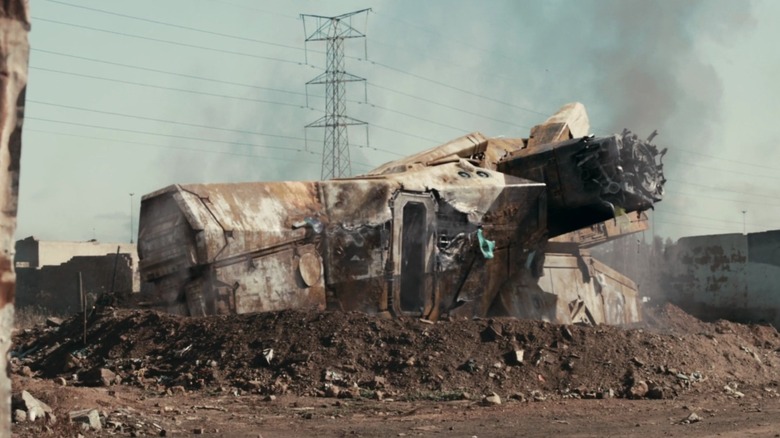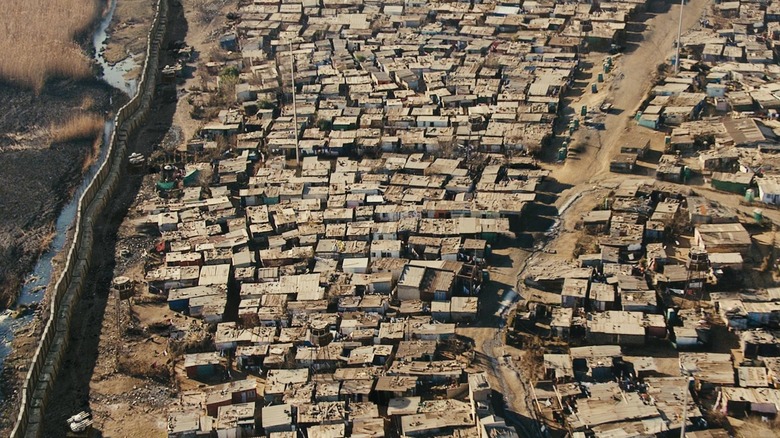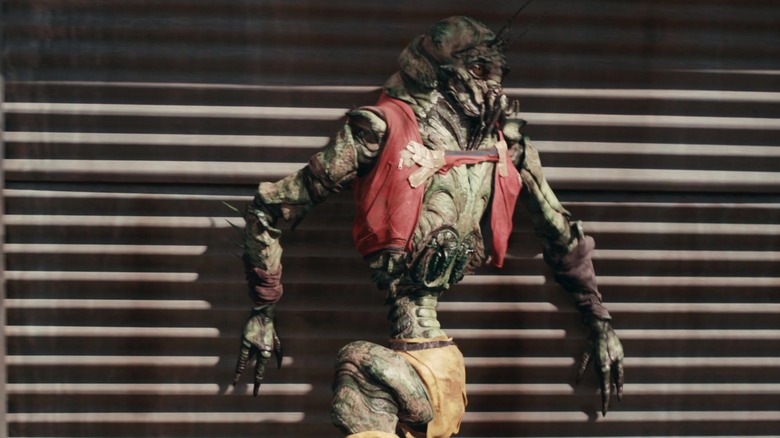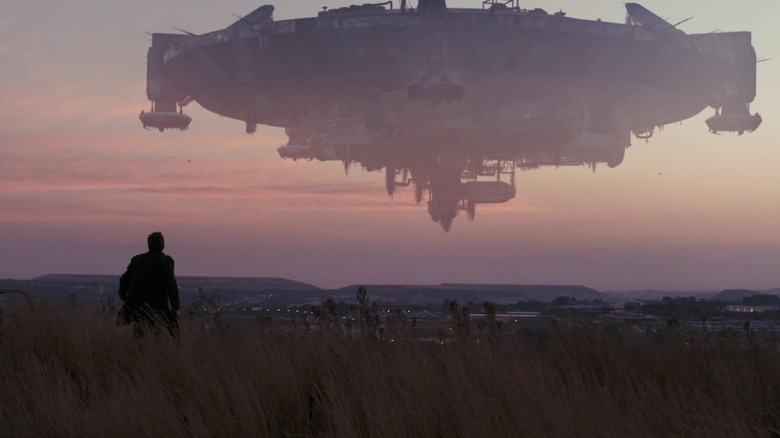District 9's Filming Location Led To Some Unsettling Overlap With Real Life
Neill Blomkamp's 2009 alien-filled masterpiece "District 9" does a lot, and it does it well. Based on the director's short film "Alive in Joburg," "District 9" sees South Africa segregate and brutalize a crustacean-like race of aliens that are stranded on Earth. When Wikus van de Merwe (Sharlto Copley), a white man working to transport the aliens away from human cities, accidentally sprays himself with alien fuel, he begins transforming into one of the creatures. Cue the body horror. But as uncomfortable as it is to watch Wikus' teeth fall out, the most disturbing part of "District 9" is its basis in reality. The film offers harsh critiques of segregation, so-called government support, and xenophobia whose real-life parallels make them all the more chilling.
Given its setting, the brutal treatment of aliens in "District 9" feels like a reference to South Africa's apartheid, which ended in 1994 but still has major repercussions to this day. Unfortunately, though, the film also resonates with other ongoing struggles faced by migrants and otherwise disenfranchised people in South Africa.
The slums were shot on location
One of the most chilling images in the film is District 9 itself. Rows after rows of run-down homes, many of which seemed to be constructed out of scrap materials, fill the screen. Yet the government deems these houses too good for the aliens — after all, they're close to human cities.
Unfortunately, the scenery was not a work of fiction. District 9 was shot on location in Chiawelo, South Africa, where the buildings' (former) residents sadly faced similar displacement.
In an interview with Gizmodo, Blomkamp reflected on the situation:
"There is this thing in Africa called RDP housing, which [is] government-subsidized housing, where they will build you a brick house in a different area of the city. And you get put on a waiting list if you're a South African impoverished resident, until you are able to get one of these houses. So the area we filmed the movie in, [...] every single resident in that area was being removed to be put into RDP housing. Although not all of them had been given the green light on the RDP housing, most of them had, but all of them were going to be moved, whether they liked it or not. [...] Each day we came to set, there were fewer and fewer people."
While the RDP program might sound promising on paper, it has been highly mismanaged. In 2009, the South African government admitted that "[m]any contractors had built shoddy houses," and "[t]he quality of the houses built in the province began to collapse." Some homes were even "too small for people to move around," and residents were eventually enlisted to help build their own homes "without proper training." Nevertheless, Chiawelo's impoverished residents were forced out under the guise of the RDP's protection.
Anti-crustacean sentiments echoed real-life prejudice against migrants
To make matters worse, the parallels between "District 9" aliens and disenfranchised South Africans extend far beyond the groups' housing challenges. As viewers might remember, the creatures in both "District 9" and "Alive in Joburg" were subject to harsh discrimination and xenophobia — sadly, this was lifted directly from South African attitudes towards migrants.
If you've watched both films (FYI, "Alive in Joburg" is only 6 minutes long and freely available on Vimeo), one similarity that really sticks out is the civilian rants. The people in "District 9" freely complain about "aliens" while the targets of the comments in "Alive in Joburg" are slightly vaguer but otherwise reveal the same harsh xenophobia. For reference, here are a few quotes from "Joburg":
"I think they're no good. Since they've come here, there is rape and murder."
"I've got a bulletproof vest. Yeah, just to protect the meat. The [aliens] can come in here and take the meat. Yeah, I'm carrying [a] firearm."
"They make people uncomfortable. We don't know how they think, what they do, so they're going to make us feel unsafe. Sometimes, they will do things you don't expect them to ... and then we will be in trouble."
As disgusting as the comments are on their own, their origin makes them far more disturbing: to obtain the footage, Blomkamp simply interviewed South Africans about their thoughts on migrants. In the director's own words (via Gizmodo):
"I was asking Black South Africans about Black Nigerians and Zimbabweans. That's actually where the idea came from [...] I asked 'What do you feel about Zimbabwean Africans living here?' And those answers — they weren't actors, those are real answers."
Looking for a clear path forward
Sadly, South Africa's disenfranchised have (at least) one more similarity with the aliens of "District 9": the cards have been stacked in such a way that it's tough to move forward. According to a 2007 article published in the Journal of African Law, "there seems to be no legitimate way for the poor to acquire land in Africa's urban areas."
To make matters worse, things don't seem to be improving. As early as August 2020, researchers from the University of the Western Cape and the South African Medical Research Council noted the pandemic disproportionately harmed migrants and other disenfranchised groups in South Africa (many of whom did not even qualify for basic, non-financial government initiatives such as food delivery packages). More recently, the topic of migrants' access to healthcare has been hotly debated, and although South African law guarantees "basic healthcare services" for all (via The Conversation), the civilian organization Operation Dudula has recently begun to block migrants from entering healthcare clinics.
Frankly, the situation is horrific.
"District 9" ends on an ambiguous note, yet one that leaves room for cautious optimism to sprout — the aliens' situation isn't improving just yet, but it might in the future. That same optimism cannot be blindly transferred to real life. As impressive as the movie ultimately is, it's also a bleak reminder of the struggles that exist beyond the screen — the ones that don't go away when the credits roll.



